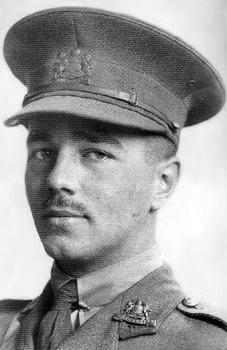
Wilfred Owen
Written in 2009
In Time of War
Baritone, Oboe, Cello, and Piano
6 minutes
Difficulty level: Good amateur/student
Wilfred Owen grew to his poetic maturity during, and as a direct result of, his experiences fighting in the trenches in the First World War. The stimulus of the horror which surrounded him provoked his poetic development, the only means he had of coping with his otherwise traumatic experiences.
The First World War is a live experience to me, not just history. It was the war of my Grandparents' generation, and one of my Grandfathers died as a result of the war. I vividly remember my maiden Great-Aunts who never married - because there were so few men left alive.
I was writing these songs during the summer of 2009, when this country had been at war continuously for six years. The papers were full of stories of soldiers dying in a faraway country for no convincing reason. A baritone singer had recently invited me to write some songs, and the poetry of Owen naturally came to mind.
Preface
My subject is War, and the pity of War.
The poetry is in the pity.
This book is not about heroes.
Nor is it about deeds, or anything about glory.
All a poet can do today is warn.
That is why Poets must be truthful.
My subject is War, and the pity of War.
The poetry is in the pity.
This book is not about heroes.
Nor is it about deeds, or anything about glory.
All a poet can do today is warn.
That is why Poets must be truthful.
Futility
Move him into the sun -
Gently its touch awoke him once,
At home, whispering of fields half sown.
Always it woke him, even in France,
Until this morning and this snow.
It anything might rouse him now
The kind old sun will know.
Think how it wakes the seeds -
Woke once the clays of a cold star.
Are limbs, so dear achieved, are sides
Full-nerved, still warm, too hard to stir?
Was it for this the clay grew tall?
- O what made fatuous sunbeams toil
To break earth's sleep at all.
Move him into the sun -
Gently its touch awoke him once,
At home, whispering of fields half sown.
Always it woke him, even in France,
Until this morning and this snow.
It anything might rouse him now
The kind old sun will know.
Think how it wakes the seeds -
Woke once the clays of a cold star.
Are limbs, so dear achieved, are sides
Full-nerved, still warm, too hard to stir?
Was it for this the clay grew tall?
- O what made fatuous sunbeams toil
To break earth's sleep at all.
Anthem for Doomed Youth
What passing-bells for those who die as cattle?
- Only the monstrous anger of the guns.
Only the stuttering rifles' rapid rattle
Can patter out their hasty orisons.
No mockeries now for them; no prayers nor bells;
Nor any voice of mourning save the choirs, -
The shrill, demented choirs of wailing shells;
And bugles calling them from sad shires.
What candles may be held to speed them all?
Not in the hands of boys but in their eyes
Shall shine the holy glimmers of goodbyes.
The pallor of girls' brows shall be their pall;
Their flowers the tender patient minds,
And each slow dusk a drawing-down of blinds.
What passing-bells for those who die as cattle?
- Only the monstrous anger of the guns.
Only the stuttering rifles' rapid rattle
Can patter out their hasty orisons.
No mockeries now for them; no prayers nor bells;
Nor any voice of mourning save the choirs, -
The shrill, demented choirs of wailing shells;
And bugles calling them from sad shires.
What candles may be held to speed them all?
Not in the hands of boys but in their eyes
Shall shine the holy glimmers of goodbyes.
The pallor of girls' brows shall be their pall;
Their flowers the tender patient minds,
And each slow dusk a drawing-down of blinds.
